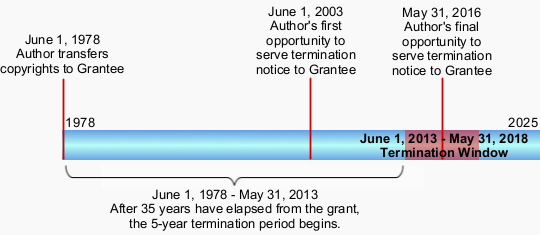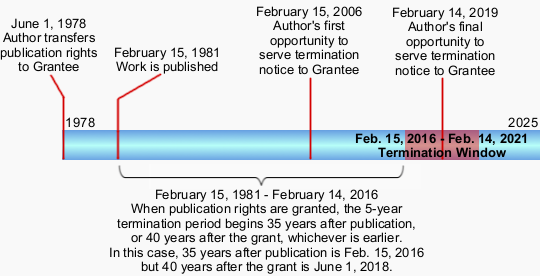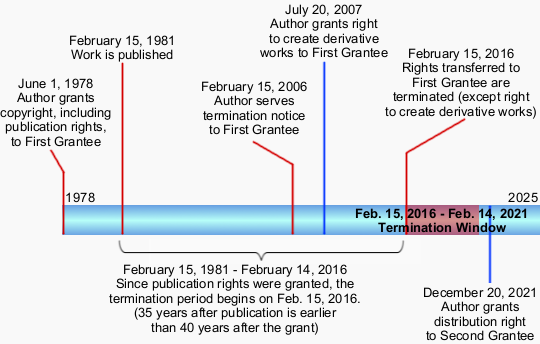If you have granted rights, there are a variety of circumstances in which you can get your rights back. First, your contract may provide for a reversion of rights, by granting rights back and/or by including an out of print clause. Second, even if your contract purports to be irrevocable, and to last for the full term of the copyright, the copyright law [PDF] gives you the opportunity to get most of your rights back 35 years after you entered into the agreement. You have this “termination right” even if your contract says not only that you gave everything away for all time but also that you promised not to try to get your rights back.
Termination
Terminating a Grant of Copyright
A creator who has transferred her rights to another entity, such as a publisher or record label, may terminate the grant in certain conditions. These conditions are covered under Section 203 of the Copyright Act, and are outlined in the accordion sections below.
For more information on termination, see "A Second Bite of the Apple: A Guide to Terminating Transfers Under Section 203 of the Copyright Act" and the Creative Commons' Termination of Transfer Tool.
The following people may terminate the grant of rights:
- The author.
- If there are multiple creators, a majority of the granting creators. For example, if the work has two authors, then both must agree (one author not making a majority); if the work has three authors, then at least two must agree to terminate.
- If the creator or creators are deceased, a majority of the beneficiaries (their surviving spouses, children or grandchildren) voting as a unit for each author and per stirpes. The following people are not considered the creator of a work under the Copyright Act, and they therefore may not terminate a grant of rights:
- An employee who created the work within the scope of his or her employment.
- A person who creates certain kinds of commissioned works, but only if both the person who commissioned the work and the creator have signed a written agreement that the work is “for hire.”
- Employee-created works and commissioned works meeting the statutory criteria are called works made for hire. The linked-to definition should include the following information in addition to the statute:
If the work you created was commissioned, but not of a kind on this list, then the work is not “for hire,” no matter what the contract says, and you can terminate the grant of rights. If the work was on this list, but your contract doesn’t say the work was “for hire,” then it is not a “work made for hire,” and you can terminate the grant of rights.
Section 203 of the Copyright Act applies to any contract entered into as of January 1, 1978. (It is important to note that section 304(c) applies to transfers of rights occurring before 1978. Thirty-five years after the grant, a five-year window opens in which the rights can revert to the creator or other holder of the termination interests. (See "Who May Terminate?") But, if the grant was for first publication rights, the start of the termination window is the earlier of 35 years from publication, or 40 years from the grant.
In order to terminate the grant, the creator or holder of the termination interests must serve a written notice between two and ten years prior to when the termination of transferred rights will occur. Thus, the first opportunity to service notice of termination under Section 203 is 25 years after the grant, and the last opportunity is 38 years after rights were transferred.
-
The notice must state the effective date of the termination, which should fall within the five-year termination window.
-
A copy of the notice must be filed with the Copyright Office before the effective date of the termination.
-
The notice and the manner in which it is served must comply with regulations issued by the Register of Copyrights.
Example: Termination timeline for rights assigned in 1978:

Example: Termination timeline for publication rights assigned in 1978:

For more information on termination, see the Copyright Office’s page on termination.
- Further grants require the same number and proportion of termination rights holders as are required for termination.
- They are valid only if made after the effective date of termination.
Exception: Termination rights holders can make further grants to the original grantees earlier than dictated by the termination timeline. After a rights holder has properly served written notice to the grantee that the grant will be terminated, she may make a further grant of rights to the original grantee prior to the effective date of termination. For example:

Termination is a “use it or lose it” proposition: If a grant of rights is not terminated within the deadlines, or if the grant is not terminated in the manner prescribed by the statute, all grants of rights continue unchanged. The statutory requirements are extensive and complicated; creators who wait till the last minute to retrieve their rights increase the risk of making errors that could undermine their ability to terminate.
In general, all rights revert to everyone who holds a termination interest -- the creator(s) (or, where relevant, their heirs), whether or not the holder signed the termination notice.
Exception: Rights to derivative works already created before termination are not affected by the termination. For example, if you granted film rights in your novel, and the film was made before you terminated, the producer can continue to exploit the film as before.
“A derivative work prepared under authority of the grant before its termination may continue to be utilized under the terms of the grant after its termination …” -- 17 U.S.C. § 203(b)(1)
Scope of the exception: The exception does not extend to new derivative works (including remakes of already-made derivative works) For example, if you granted film rights in your novel, and one film was made before you terminated, the producer cannot now make sequels or other new adaptations, though it can continue to exploit the original film. “ … but this privilege does not extend to the preparation after the termination of other derivative works based upon the copyrighted work covered by the grant” -- 17 U.S.C. § 203(b)(1)
“The exclusive or nonexclusive grant of a transfer or a license of copyright or of any right under a copyright, executed by an author on or after January 1, 1978, otherwise than by will” -- 17 U.S.C. § 203(a)
In order for a grant to be terminable, the following conditions must be met:
- A transfer, license, or any copyright interest was granted
- By a creator,
- Including exclusive or nonexclusive rights.
- The grant was made on or after January 1, 1978.
- The grant was not made by a will.
The following grants may NOT be terminated:
- Works made for hire.
- Dispositions by will.
Termination rights remain with the creator, even if the contract purports to give them away or makes the creator promise not to exercise them. In other words, even if your contract claims to be “perpetual” and/or “irrevocable,” you can still terminate the grant. [link to some examples of such contracts]
“Termination of the grant may be effected notwithstanding any agreement to the contrary, including an agreement to make a will or to make any future grant.” -- 17 U.S.C. § 203(a)(5)
- Example: During a legal dispute over the right to renew the copyright (under an earlier version of the Copyright Act) in the Captain America character and comics, creator Joseph H. Simon signed an agreement stating that his work “was done as an employee for hire.” In a subsequent lawsuit over the right to terminate the copyright assignment, the court in Marvel Characters, Inc. v. Simon held that an “agreement made subsequent to a work’s creation which retroactively deems it a ‘work for hire’” does not negate the author’s termination rights if the work was not in fact a work made for hire.
You can always agree with your co-contractant to end the grant of rights before 35 years have passed. (For example, “out of print” clauses are a kind of agreed-upon termination.) BUT, be aware that if you agree to terminate a contract, and then enter into a new contract with the same co-contractant, the 35-year statutory termination time clock starts all over again with the new contract; you may not be able to tack on the, say, fifteen years elapsed under the old contract to twenty years under the new.
Out-of-Print Clauses
If your contract has an “out of print” clause, here are some points to look out for:
- Is the term “in print” clearly defined?
- Is there a minimum number of books that must be sold in order for the item to be considered “in print”?
- Are electronic versions of the work included in the definition?
- How much time does the publisher have to put the book back on sale if the author invokes the “out of print” clause?
- Can the author recapture some rights that the publisher is not exploiting (say to an electronic version of the work) even if the book is available in other formats?
Grants Back
An increasing number of contracts demand exclusive rights of varying scope depending on the contract, but then provide that the author gets the rights back after a certain time (for example, one year). (For an example of this type of clause, see our sample clause #16). Or some provide that after a certain period, the creator gets the rights back, but the grantee may continue to engage in certain kinds of exploitations on a non-exclusive basis. Depending on the contract, the creator and grantee may exploit the work without getting each other’s approval; depending on the contract, the grantee may keep on exploiting the work on a non-exclusive basis without having to pay the author.
If you have to give up exclusive rights, this is a fairly creator-friendly compromise, but you may want to try to retrieve enough control to have a say in what the grantee does (or to get paid for it).
